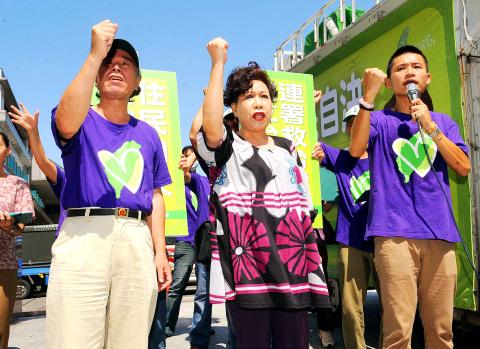Ellen Huang (黃越綏), a strong proponent of Taiwanese independence who advocated self-determination and founding a nation through a referendum as part of her presidential bid, announced yesterday that she was dropping out of the race.
Huang’s decision was seen as an expression of goodwill toward Democratic Progressive Party (DPP) Chairperson Tsai Ing-wen’s (蔡英文) presidential bid.
However, the Taiwanese National Party, another pro-independence group, announced in the afternoon that its founder, Chang Mung-hsieh (莊孟學), would enter the race.

Photo: Chang Chia-ming, Taipei Times
Huang’s unexpected decision and Chuang’s entry into the race have drawn attention, but it is said that Chang and Tsai would work toward the same goal although their approach might be different.
Taiwanese National Party founding chairman Huang Hua (黃華) said the party’s decision to nominate Chang would not affect Tsai’s chances in the election, because they would only advocate the foundation of an independent Taiwan as a nation in the election process.
“We will say what is inappropriate for Tsai to say,” Huang Hua said, adding that they would support Tsai for president.
Ellen Huang’s campaign office spokesperson, Chang Ming-yu (張銘祐), said her decision was indicative of consolidation within the pro-independence groups and an expression of goodwill to Tsai.
“The process of collecting signatures to join the election was for the purpose of emphasizing self-determination and founding a nation through referendum,” Chang said.
Accompanied by several senior independence proponents, Peng Ming-min (彭明敏) and Su Beng (史明), Ellen Huang held a press conference where the more than 100,000 signatures collected for her sake were unveiled.
She reaffirmed the concept of self-determination and the founding of a nation through referendum.
Huang Hua said Chuang was a former education section chief at the Lee Teng-Hui Academy, adding that it was the party’s view that a candidate who supports the founding of an independent nation must join the election.

Taiwanese can file complaints with the Tourism Administration to report travel agencies if their activities caused termination of a person’s citizenship, Mainland Affairs Council Minister Chiu Chui-cheng (邱垂正) said yesterday, after a podcaster highlighted a case in which a person’s citizenship was canceled for receiving a single-use Chinese passport to enter Russia. The council is aware of incidents in which people who signed up through Chinese travel agencies for tours of Russia were told they could obtain Russian visas and fast-track border clearance, Chiu told reporters on the sidelines of an event in Taipei. However, the travel agencies actually applied

Japanese footwear brand Onitsuka Tiger today issued a public apology and said it has suspended an employee amid allegations that the staff member discriminated against a Vietnamese customer at its Taipei 101 store. Posting on the social media platform Threads yesterday, a user said that an employee at the store said that “those shoes are very expensive” when her friend, who is a migrant worker from Vietnam, asked for assistance. The employee then ignored her until she asked again, to which she replied: "We don't have a size 37." The post had amassed nearly 26,000 likes and 916 comments as of this

New measures aimed at making Taiwan more attractive to foreign professionals came into effect this month, the National Development Council said yesterday. Among the changes, international students at Taiwanese universities would be able to work in Taiwan without a work permit in the two years after they graduate, explainer materials provided by the council said. In addition, foreign nationals who graduated from one of the world’s top 200 universities within the past five years can also apply for a two-year open work permit. Previously, those graduates would have needed to apply for a work permit using point-based criteria or have a Taiwanese company

The Shilin District Prosecutors’ Office yesterday indicted two Taiwanese and issued a wanted notice for Pete Liu (劉作虎), founder of Shenzhen-based smartphone manufacturer OnePlus Technology Co (萬普拉斯科技), for allegedly contravening the Act Governing Relations Between the People of the Taiwan Area and the Mainland Area (臺灣地區與大陸地區人民關係條例) by poaching 70 engineers in Taiwan. Liu allegedly traveled to Taiwan at the end of 2014 and met with a Taiwanese man surnamed Lin (林) to discuss establishing a mobile software research and development (R&D) team in Taiwan, prosecutors said. Without approval from the government, Lin, following Liu’s instructions, recruited more than 70 software